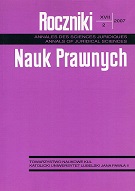Implementacja umów międzynarodowych do systemów prawa krajowego, ze szczególnym uwzględnieniem Włoch (w tym statusu regionów)
The Implementation of International Agreements in Systems of Domestic Law as Best Exemplified by Italian Law (Including the Status of the Regions)
Author(s): Jarosław SozańskiSubject(s): Law, Constitution, Jurisprudence
Published by: Towarzystwo Naukowe KUL & Katolicki Uniwersytet Lubelski Jana Pawła II
Keywords: implementation of international agreements; systems of internal law; European Union; implementacja umów międzynarodowych; system prawa wewnętrznego; Unia Europejska
Summary/Abstract: Although the obligation to implement international agreements in the internal law (municipal law) is expressly stated in international law, the ways of realising this obligation are not specified. They are left to the discretion of sovereign states whose decisions are made in accordance with the constitutional order. Hence, individual states can adopt a variety of solutions – from those that provide full effectiveness (thus providing full implementation) of agreements on the grounds of internal law to those solutions which allow the national authorities to treat the above mentiond obligation instrumentally (or even manipulatively). The issue, rarely discussed in manuals on treaty law, is extremely important as full and actual use of norms and obligations of such agreements depends chiefly on the effectiveness of an international agreement being implemented internally. Various solutions to this issue relate to both indirect (direct or indirect reception) and direct method of introducing the internal law into national systems. The British, Scandinavian, Italian, and German models propose interesting solutions. It is noteworthy in the Italian system that customary norms of the international alw always have a constitutional dimension, and the level of international agreements depends on the level of the normative transformational act, while their effectiveness depends on ordine di esecuzione. Moreover, the distribution of treaty competences among the state and the regions gives rise to a unique situation. In all cases treaties concluded in or by the European Union have their specificity.
Journal: Roczniki Nauk Prawnych
- Issue Year: 17/2007
- Issue No: 2
- Page Range: 37-54
- Page Count: 18
- Language: Polish

